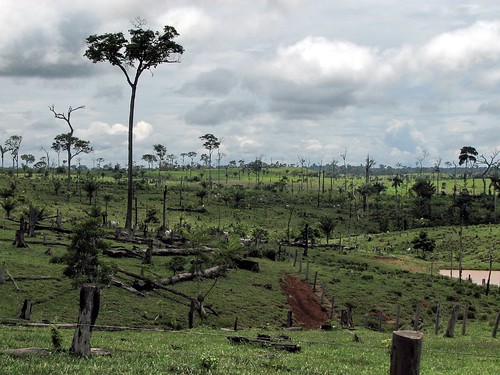
Deforestation in Capixaba AC Brasil - photo: lou gold
On Wednesday (25 April) the Chamber of Deputies of the Brazilian Congress rejected even the minor pro-environment compromises that had been passed by the Senate and were supported by President Dilma, voting for a devastating new Forest Code on the eve of the UN sustainability meetings - RIO+20 - which will take place next month in Rio de Janeiro. Brazil had hoped to showcase itself as the leading example in the world of a country capable of significantly reducing deforestation. Now, all that has been put to risk.
Greenpeace's lead Amazon campaigner Paulo Adario, who in February who was awarded by the UN the title of "Forest Hero", sums up what happened and calls upon President Dilma to veto the onerous clauses in the new code:
"We have just witnessed the abduction of Congress by ruralistas [the farm bloc]. Pathetically, the president [who] had the largest base of parliamentary support in the recent history of this country, was defeated by 274 votes of a gang of ruralistas that infiltrated and contaminated the democratic fabric of Brazil as a cancer... Since the beginning of the process, Brazil has been hostage to the interests of the [agricultural] sector, which did its best to incorporate their demands in the bill. The [general] population, which was opposed to amnesty for loggers and loopholes that allow more devastation, this time was ignored. "
"While Congress clearly shows that it is divorced from public opinion which it should represent - and that overwhelmingly opposes the ruralist text [in the new code] - Dilma is left to a single alternative. She has to demonstrate to Brazilians that she is up to the office she holds - and she won by promising voters that would not allow environmental criminals amnesty or new deforestation." Translated by google from Greenpeace's Brasil page.WWF lists the negative features of the amended code:
*The draft amendment notably complicates Brazil’s forest legislation, making it nearly impossible to implement and enforce.President Dilma
*Millions of acres illegally cleared prior to 2008 will be legalized through amnesty, resulting in a forfeiture of fines worth an estimated US$4.8 billion.
*In the Amazon region, landowners could be allowed to reduce the obligatory required forest cover from 80% to 50%.
*Up to 90% of private properties in Brazil could be pardoned from the standing obligation to restore illegally cleared areas.
*Large areas of floodplains and other sensitive areas will be opened to cattle ranching and farming.
*Brazil’s economy, and in particular its agribusiness sector, will suffer from damaged global reputation, decreased access to markets for sustainably-sourced goods, and higher production costs as a consequence of increased erosion and greater need for fertilizers and/or pesticides.
*Brazil will likely fail to meet its own international commitments to reduce greenhouse gas emissions and deforestation rates.
This is absolutely tragic :(
ReplyDelete